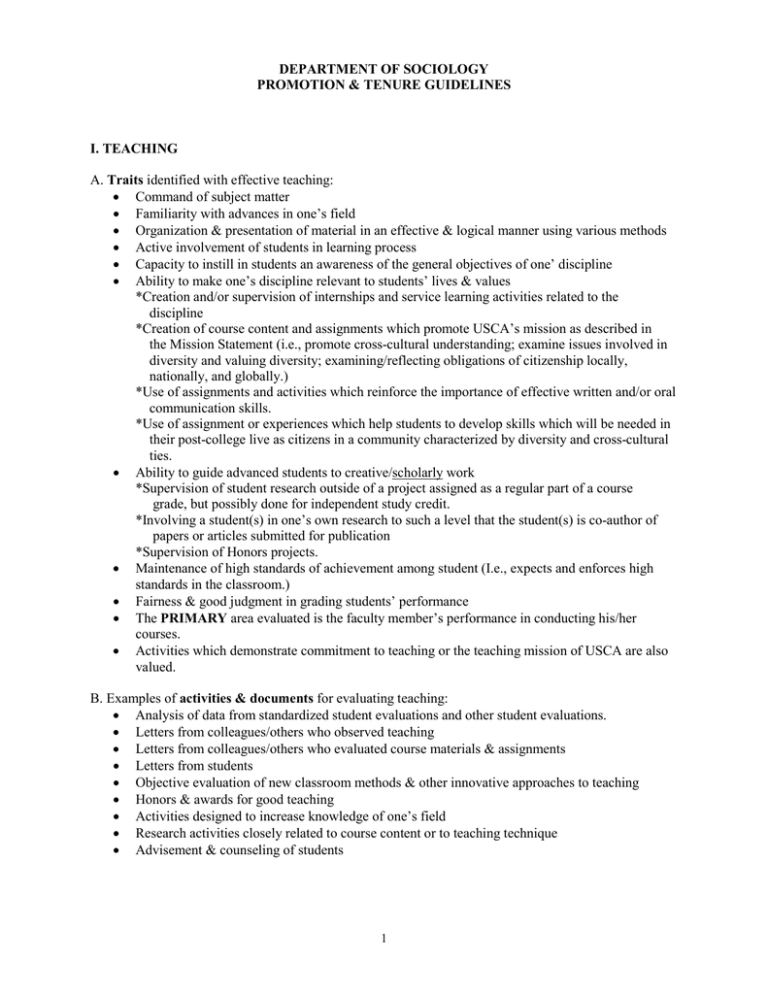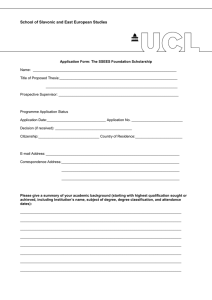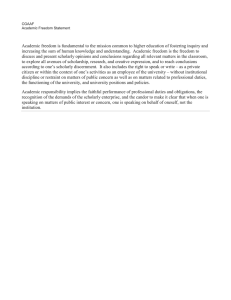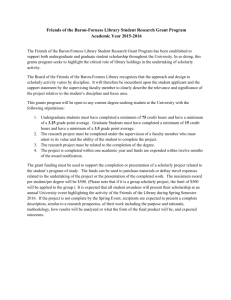Traits • Command of subject matter
advertisement

DEPARTMENT OF SOCIOLOGY PROMOTION & TENURE GUIDELINES I. TEACHING A. Traits identified with effective teaching: • Command of subject matter • Familiarity with advances in one’s field • Organization & presentation of material in an effective & logical manner using various methods • Active involvement of students in learning process • Capacity to instill in students an awareness of the general objectives of one’ discipline • Ability to make one’s discipline relevant to students’ lives & values *Creation and/or supervision of internships and service learning activities related to the discipline *Creation of course content and assignments which promote USCA’s mission as described in the Mission Statement (i.e., promote cross-cultural understanding; examine issues involved in diversity and valuing diversity; examining/reflecting obligations of citizenship locally, nationally, and globally.) *Use of assignments and activities which reinforce the importance of effective written and/or oral communication skills. *Use of assignment or experiences which help students to develop skills which will be needed in their post-college live as citizens in a community characterized by diversity and cross-cultural ties. • Ability to guide advanced students to creative/scholarly work *Supervision of student research outside of a project assigned as a regular part of a course grade, but possibly done for independent study credit. *Involving a student(s) in one’s own research to such a level that the student(s) is co-author of papers or articles submitted for publication *Supervision of Honors projects. • Maintenance of high standards of achievement among student (I.e., expects and enforces high standards in the classroom.) • Fairness & good judgment in grading students’ performance • The PRIMARY area evaluated is the faculty member’s performance in conducting his/her courses. • Activities which demonstrate commitment to teaching or the teaching mission of USCA are also valued. B. Examples of activities & documents for evaluating teaching: • Analysis of data from standardized student evaluations and other student evaluations. • Letters from colleagues/others who observed teaching • Letters from colleagues/others who evaluated course materials & assignments • Letters from students • Objective evaluation of new classroom methods & other innovative approaches to teaching • Honors & awards for good teaching • Activities designed to increase knowledge of one’s field • Research activities closely related to course content or to teaching technique • Advisement & counseling of students 1 • • • Attendance at workshops, seminars, etc. related to one’s teaching Written reports/papers or workshops presented on teaching methods/philosophy Other relevant activities *Developing and delivering courses in one’s discipline which serve the needs of our students (majors/minors/general education offerings) and/or enhance the major or minor II. SCHOLARLY/CREATIVE/APPLIED PROFESSIONAL ACTIVITIES A. Activities/Products in this category (*quality of the work more important than quantity) • Scholarly/creative applied professional activities that enhance teaching and curriculum development are valued. Quantitative and qualitative research should be regarded as of equal importance and value to the discipline. Publication in interdisciplinary or non-sociology (or anthropology or geography) journals is common practice in anthropology, geography, and sociology and should not be considered of lesser value than publications in journals clearly dedicated to the faculty member’s academic discipline. It is the faculty member’s responsibility to provide clarification of the disciplinary overlap when that is not apparent from the journal title. • Scholarly contribution to one’s academic discipline (traditional) • Creative activity characteristic of or related to the academic discipline B. Examples of activities & documents for evaluating Scholarly/Applied/Professional Activity • Published articles, books, reviews, critiques, monographs. Peer-reviewed publications, under most circumstances, should be given greater weight than non-peer reviewed articles. Non-peer reviewed, scholarly publications should be valued as scholarship as well. Examples of non-peer reviewed publications are articles for encyclopedias and other reference works, reviews of scholarly books, conference proceedings, and scholarly pieces a faculty member might be invited to write for a book or other publication. It is the responsibility of the faculty member to document the value of such work in his/her P&T file. These may include publications for which the author is compensated, as well as those for which there is no financial compensation. • Presentations at professional or scholarly meetings/conferences In most cases, presentations/poster sessions at international and national meetings should be given the greatest weight in considering presentations at professional meetings. Next in order are papers presented at regional meetings, then state meetings, and finally local meetings. (There may be exceptions to this guideline, in which case it is the candidate’s responsibility to document the rationale for the exception.) • Reviews of/evidence of successful applied professional activities • Grants/fellowships received/applied for. Such scholarly activities often involve numerous steps, all of which should be acknowledged as significant. These steps may take place over a number of months or even years and include: (1) preparing and writing fellowship and grant applications, (2) receiving an award, (3) participating in the fellowship experience or conducting the research, (4) disseminating the results of the activity in appropriate scholarly ways. Criteria to be considered in weighting these activities are the competitiveness of the fellowship or grant, the extent and type of work required for preparation of the application, the amount of the award, and the external or internal nature of the grant. • Awards or prizes won • Peer evaluations of scholarly work or applied professional activities (within or outside the campus) • Descriptions of scholarly or creative work in progress 2 • • • • • Field work. This form of research occurs outside of a library, traditional laboratory, or archival setting. Fieldwork is a method of collecting data which may include face-to-face interviews with respondents in their own environments, participant observation, simple observation, archeological excavation, and similar activities. Anthropologists, geographers, and sociologists often engage in such fieldwork to collect data. Other relevant activities (at conferences/professional meetings: chair a session, present a roundtable discussion, serve as a discussant for papers, preparation and publication of invited reviews) When a presentation to professional or community groups might overlap categories, it should be the P&T candidate's prerogative to determine whether it will be counted toward scholarship, teaching, or community service. The candidate is then responsible for providing a justification for that choice. Scholarship which enhances teaching can be counted under both Scholarship and Teaching as long as the candidate provides evidence of how it was used in Teaching and that use is significant (e.g., subject of all or most of an entire class period or more, the basis for a significant assignment for students or class exercise.) Articles in non-scholarly publications may be counted as scholarship if the faculty member provides adequate justification of the way in which research related to her/his discipline was used in the piece. (Examples might include newspaper or magazine articles.) III. UNIVERSITY, PROFESSIONAL, AND COMMUNITY SERVICE A. Types of Service • To the effective functioning of academic unit or campus • To the teaching profession or his/her discipline • To the community at large a) related to the faculty member’s field of expertise b) which promotes the mission of USCA (i.e., presentations and/or involvement in programs which promote citizenship (local, national, global), examine and promote diversity, and promote cross-cultural understanding). These endeavors may be compensated or uncompensated. B. Activities (to be documented by letters from colleagues, personal description or major documents produced in this service) • Service on committees (departmental, college, university) • Service to student organizations • Assigned duties within department • Service to appropriate professional organizations • Presentations to civic groups or local schools • Organization of symposia, conferences, workshops • Service on boards, agencies, & commissions (local, state, national) • Professional assistance to other faculty members • Service as department chair, coordinator, or other part-time administrator • Other service activities (e.g., development of relationships with community organizations which might be in conjunction with placing students into service-learning or internship experiences, and involvement in community projects and/or organizations, including those which do not directly relate to one’s academic discipline, but which promote USCA’s mission.) 3



